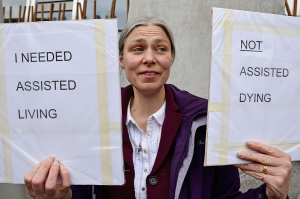Anti-Israel Campaigns Spread Anti-Semitism on College Campuses
Indeed, academics who buck this trend may be endangering their careers. At Connecticut College, one of the few professors who defended Andrew Pessin, who hasn't been in his classroom for the past year after a hate-filled campaign miscast his comments about Hamas as a smear on all Palestinians, says his stance cost him a promotion. Manuel Lizarralde, associate professor in Ethnobotany, wrote in a faculty-wide email Jan. 26 that the college "acted like vigilantes and found the perfect scapegoat," in Pessin.
Within days, Lizarralde said, he was called in by the administration for a scolding. Noting that he was recently denied promotion, Lizarralde suggested in a recent email that this was payback for his support of Pessin. Connecticut College has "a sense of racism since we are Latinos, Jews and advocate for social injustice ... [and we] are being punished [for such activism]."
Responding to the negative media coverage generated by the Pessin case, Connecticut College President Katherine Bergeron published an email to the faculty March 28, in which she championed "the right of all its members to express their views freely and openly."
She failed to explain how that principle applied to Pessin, who was hounded off campus for expressing his views, only to see them twisted and turned against him. She said that the school should promote "reasoned and informed debate about the most complex issues of our time," but Pessin's absence leaves the school with no pro-Israel voice. When asked about the contradictions between her email and the Pessin affair, she declined to comment.
Meanwhile, outrage against Connecticut College continues to build, with a petition to investigate the Pessin affair and revoke the school's accreditation now exceeding 1,500 signatures.
Just as the character assassination targeting the only pro-Israel voice at Connecticut College appeared as a total surprise, BDS campaigns to influence student government votes across the country pop up with minimal notice, just weeks before the vote, giving the opposition little time to organize. That strategy helped secure SJP a BDS victory at the University of Chicago undergraduate student government in March. It failed to persuade the university's administration, though.
Who is funding BDS?
Analyst Jonathan Schanzer of the Foundation for Defense of Democracies recently told members of Congress that former employees of Hamas-linked charities now work for the Illinois-based organization American Muslims for Palestine (AMP), which is "arguably the leading BDS organization in the US, a key sponsor of the anti-Israel campus network known as Students for Justice in Palestine."
Schanzer noted that AMP provides money, speakers, training and even "apartheid walls" to SJP campus activists. More surprising, the Rockefeller Brothers Fund has given anti-Israel BDS organizations hundreds of thousands of dollars, according to the Shurat Hadin Israel Law Center.
On campus after campus, the BDS movement has proven itself to be well organized and determined to poison the minds of impressionable students against Israel. It will take an equally concerted and sustained effort to oppose BDS in academia.





























